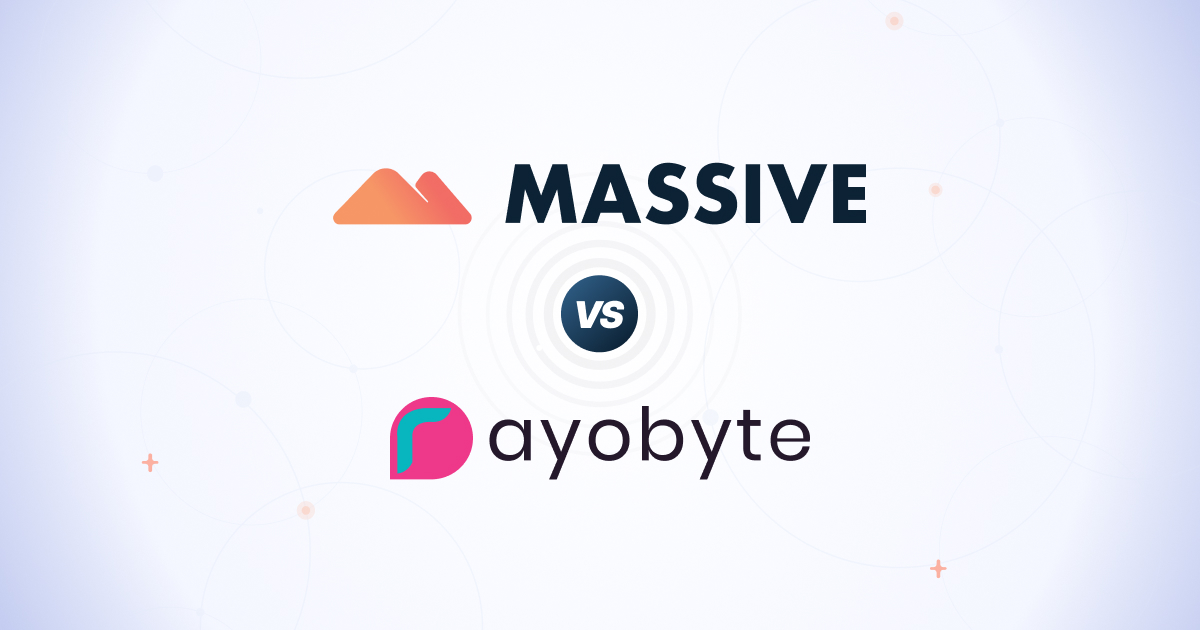Mobile proxies are one of the most powerful types of proxies. They are highly effective but can be quite expensive. They're often used when other proxy types are not enough. In this guide, you’ll learn what makes mobile proxies so powerful, how they work, and what to expect if you decide to use them.

What is a Mobile Proxy?
A mobile proxy is a type of proxy server that uses the IP address of a real mobile device connected to a mobile network. Mobile proxies work by routing your internet traffic through a mobile IP and make it look like you’re browsing from a regular smartphone.
Unlike datacenter or residential proxies, mobile proxies rely on real mobile networks provided by mobile carriers like AT&T, T-Mobile, and Verizon. Traffic from mobile proxies appears as if it is coming from real mobile users. This makes them more reliable and harder for websites to detect or block. It’s important to note that the connection must come from mobile data, not Wi-Fi, for it to be considered a true mobile proxy.
They are ideal for web scraping, data collection, and app development, and can be used with residential proxies for added anonymity.
Why Are Mobile Proxies Special and Expensive?
Mobile proxies stand out among other proxy types because of their exceptional IP reputation. Websites are hesitant to block them due to the way mobile networks handle mobile IP addresses. This traces back to the limited availability of IPv4 addresses—the protocol that supports over 4 billion unique IPs globally. Many of these addresses are locked away by governments or other institutions, therefore, unavailable for general use.
When mobile operators entered the market, most IPv4 combinations had already been distributed. To manage the growing number of mobile devices, they implemented a technology called Carrier-Grade NAT (CGNAT). This allows a single public IP address to serve hundreds of users simultaneously. Blocking a mobile IP could unintentionally disrupt access for many legitimate users, leading websites reluctant to blacklist these addresses.

The cost of mobile proxies is also influenced by their limited availability and higher infrastructure demands. Mobile proxies require connections through actual cellular networks, which are more expensive to maintain than broadband. This, along with their unmatched trustworthiness, often makes mobile proxies significantly more expensive than residential or datacenter options.
In summary, their scarcity, higher costs for bandwidth, and superior ability to avoid blocks explain why mobile proxies are both special and expensive.
How Are Mobile Proxies Made?
There are two main methods to create these proxies: borrowing IPs from other people or using SIM card farms.
Proxy providers borrow IPs from other people through embedding software (SDK) into popular apps. This turn devices that download these apps into proxy nodes (just like that in residential proxies). This method allows for creating large and diverse mobile proxy network. The downside is, the proxies can be unpredictable since the IP source might go offline at any time.
SIM card farms, on the other hand, rely on USB dongles and special software to connect multiple SIM cards to mobile networks. They are smaller and more localized, designed for limited-scale use with access to one IP at a time instead of an entire IP pool. SIM card farms offer a more stable and reliable connection compared to borrowed IPs. The performance is consistent because the setup is controlled and doesn’t rely on random users staying online. Additionally, the proxies rotate IP addresses at set, predictable intervals, meaning users rarely have access to the same IP address for extended periods.
What to Know Before Using Mobile Proxies
Mobile proxies offer a lot of advantages, including unparalleled authenticity, high anonymity, and a balanced cost-to-performance ratio. However, they also come with a few trade-offs. Here’s a quick rundown of what you can expect:
Pros of using mobile proxies
- Fewer blocks and interruptions – Mobile IPs face fewer restrictions, whether you're scraping search engines or automating social media tasks. This makes them one of the most reliable proxy types.
- Automatic IP rotation – Mobile IPs change frequently. With real-user proxies, the IP rotation is less predictable. Even SIM card farms experience periodic IP changes because mobile carriers rotate them. For proof, try toggling airplane mode to see your IP change.
Cons of using mobile proxies
- High cost – Mobile proxies are among the most expensive options. They cost several times more than residential proxies and can be ten times pricier than datacenter proxies.
- Slower speeds – Mobile proxies are slower than other proxy types. Speeds range from 5 to 50 Mbps, depending on whether you're using 3G or 4G connections. Latency is usually higher as well.
While mobile proxies offer unique advantages, it’s important to weigh their benefits against their limitations before investing.
Types of Mobile Proxies
Mobile proxies are categorized based on how they operate and their intended use. Here are the main types:
Rotating mobile proxies
These are a type of proxies where the IP address changes or rotates at regular intervals or for every new session.
Dedicated mobile proxies
Also known as private mobile proxies, they offer exclusive use of a specific IP address to a single user.
4G mobile proxies/ LTE proxies
This type of proxy relies on IPs from 4G networks, providing high-speed and reliable internet connections.
5G mobile proxies
5G proxies offer much faster speeds and lower latency compared to 4G. This makes them ideal for high-performance tasks. While 5G sounds impressive, widespread adoption is still years away, meaning its full potential isn’t quite here yet. However, some providers already offer 5G-only proxy pools, which may provide a slight edge in performance—but expect to pay a premium for them.
Comparing Mobile Proxies with other Proxy Types
Mobile proxies stand out from other proxy types due to how mobile carriers assign IP addresses to devices. While all proxies mask your internet location and IP address, each type has unique features and use cases. How do they compare? Let’s take a look:
<table class="GeneratedTable">
<thead>
<tr>
<th>Feature</th>
<th>Mobile Proxies</th>
<th>Residential Proxies</th>
<th>Datacenter Proxies</th>
<th>ISP Proxies</th>
</tr>
</thead>
<tbody>
<tr>
<td>IP Source</td>
<td>Real mobile devices on cellular networks</td>
<td>Real household devices on Wi-Fi</td>
<td>Servers in data centers</td>
<td>Real ISP-assigned IPs from static broadband</td>
</tr>
<tr>
<td>Reliability</td>
<td>Highly reliable, hard to detect</td>
<td>Reliable, but more detectable than mobile</td>
<td>Less reliable, easily detected</td>
<td>Reliable, with better trust than datacenter</td>
</tr>
<tr>
<td>Speed</td>
<td>Slower (5–50 Mbps)</td>
<td>Moderate (10–100 Mbps)</td>
<td>Fast (up to 1 Gbps)</td>
<td>Very fast (up to 1 Gbps)</td>
</tr>
<tr>
<td>Cost</td>
<td>Most expensive</td>
<td>Moderate</td>
<td>Cheapest</td>
<td>Expensive</td>
</tr>
<tr>
<td>Anonymity</td>
<td>High, mimics real mobile users</td>
<td>High, mimics real household users</td>
<td>Low, often flagged as bot traffic</td>
<td>High, trusted as static residential IPs</td>
</tr>
<tr>
<td>IP Rotation</td>
<td>Frequent and dynamic</td>
<td>Can be static or rotating</td>
<td>Static or session-based</td>
<td>Mostly static</td>
</tr>
<tr>
<td>Detection Risk</td>
<td>Lowest</td>
<td>Low</td>
<td>High</td>
<td>Low</td>
</tr>
</tbody>
</table>
Use Cases for Mobile Proxies
If you’re considering mobile proxies, you probably already have a task in mind. However, exploring common use cases can help you confirm they’re the right tool or even inspire other applications.
Mobile proxies are ideal for accessing platforms with strict security measures. These include websites and apps that actively block or flag suspicious behavior.
One popular use is social media management, such as running multiple accounts on platforms like Instagram and Facebook. Mobile proxies help reduce blocks and bypass verification checks for smoother account activity. Their IP rotation feature also helps maintain anonymity, as long as the IPs remain within the same location.
App developers often use mobile proxies to test their apps and websites on real mobile networks. Advertisers rely on them for ad verification to check and make sure that their campaigns are displayed correctly and reach the intended audience on mobile devices. Similarly, researchers use mobile proxies for market research to gather data and insights without location-based restrictions.
Although not as common, mobile proxies can also be used for web scraping, especially when data needs to be collected from mobile-optimized websites or apps.
There are countless other ways to use mobile proxies, depending on your specific needs. They’re a reliable choice when precision, flexibility, and authenticity are your top priority.
Choosing the Best Mobile Proxy Service

Choosing the right mobile proxy provider is important for getting the results you need. Not all providers offer the same level of quality, so here are some key points to consider:
1. Network Coverage
Look for a provider with proxies available in many locations. This is helpful if you need access to specific regions or want to bypass location-based restrictions.
2. Reliability and Speed
A good provider should offer stable connections with minimal downtime. While mobile proxies are slower than datacenter options, a reliable provider will still deliver consistent performance.
3. IP Rotation Options
Check if the provider offers flexible IP rotation. Depending on your needs, you might prefer frequent IP changes or longer sessions with the same IP address.
4. Reputation and Reviews
Research the provider’s track record. Customer reviews and testimonials can give you a clear idea of their performance and customer support.
5. Pricing
Mobile proxies are more expensive than other types. Compare prices and look for a provider that offers good value for money without cutting corners on quality.
6. Extra Features
Some providers offer additional features like analytics, customizable rotation settings, or extra security options. These can be helpful depending on your specific use case.
Considering these factors, you can confidently choose a mobile proxy provider that meets your needs and delivers dependable performance. While mobile proxies are relatively new compared to other proxy types, they leverage advancements in mobile networks to offer unique benefits. Although many providers are still expanding their mobile IP offerings, there are already excellent services available, giving you plenty of options to get started.
Frequently Asked Questions
1. Are mobile proxies better than residential proxies?
Mobile proxies offer better anonymity and are harder to detect, but they are more expensive and slower. Residential proxies are a good alternative for less demanding tasks.
2. Why are mobile proxies so expensive?
They rely on real mobile networks, require costly infrastructure, and are in high demand.
3. Can mobile proxies be used for web scraping?
Yes, especially for scraping mobile-optimized websites or apps with strict security measures.
4. Do mobile proxies support IP rotation?
Yes, they frequently rotate IPs, either automatically or at set intervals, to maintain anonymity.
5. What tasks are mobile proxies best for?
They are ideal for social media management, ad verification, app testing, and bypassing geo-blocks.
6. Are mobile proxies faster than datacenter proxies?
No, mobile proxies are slower due to the limitations of mobile networks.
7. How are mobile proxies created?
They are created by borrowing IPs through apps or using SIM card farms connected to mobile networks.
8. Can I use mobile proxies for gaming?
Yes, but the slower speeds and higher latency may not be ideal for fast-paced games.
9. Are mobile proxies legal to use?
Yes, but ensure compliance with the terms of service of the platforms you are accessing.

I am the co-founder & CEO of Massive. In addition to working on startups, I am a musician, athlete, mentor, event host, and volunteer.







